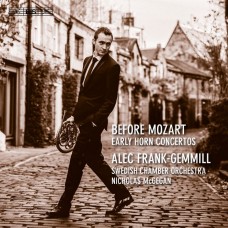在莫扎特之前….早期法國號協奏曲集 弗朗克-傑莫爾 法國號 尼可拉斯.麥克吉更 指揮 瑞典室內管弦樂團 / Alec Frank-Gemmill / Before Mozart - early horn concertos
|
Mozart's horn concertos are so well-known that for many listeners the sound of the horn and Mozart are virtually synonymous. Mozart was not the first composer to write solo concertos for the horn, however, and works from earlier on in the eighteenth century give a quite different perspective on the instrument. With this disc soloist Alec Frank-Gemmill provides insights into some of these early horn concertos, by composers ranging from Telemann to Haydn, by way of Mozart's own father, Leopold. In the seventeenth century, when the horn first appeared in classical music, it was in the context of hunting scenes in operas by Lully, Cavalli and others. But the instrument's true adoption into art music really began the following century in the German-speaking world, where Dresden for a while became the most important centre for performing on, and composing for, the horn. Around 1750, both Christoph Förster and Johann Baptist Georg Neruda wrote extremely demanding and virtuosic concertos – Neruda's Concerto in E flat major is in such a high register that it has sometimes been assumed to be composed for the trumpet. Through modern innovations in horn design it is once more possible to perform all of these early horn concertos, including parts previously considered 'impossibly high'.
|
編號 |
曲目 |
長度 |
作詞 |
作曲 |
演奏 |
樂團 |
演唱 |
指揮 |
試聽 |
|---|



